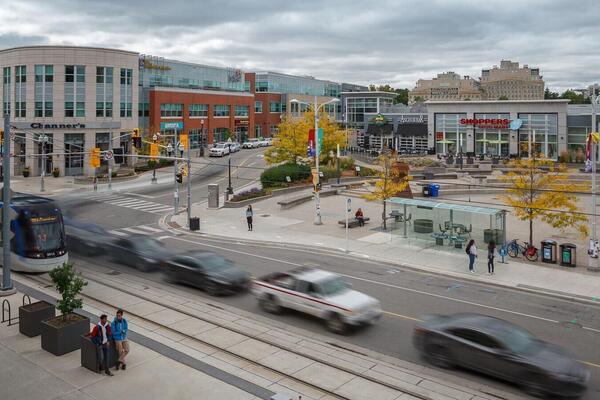
Rebooting with Research
Post-COVID poses unique challenges alongside unique opportunities in approaching real-world problems

Post-COVID poses unique challenges alongside unique opportunities in approaching real-world problems
By Angela Olano Office of ResearchAs COVID-19 has introduced a host of new challenges to the world collectively, it is simultaneously presenting new opportunities and approaches to existing, real-word problems, according to a panel of experts at the University of Waterloo.
The first of a series of post-COVID-19 Rebooting with Research panels: Tackling real-world problems was the fourth in GEDI’s spring Reboot Panel Series. GEDI, University of Waterloo’s Gateway for Enterprises to Discover Innovation, arranged the panel series as a platform for researchers and industry leaders to jointly explore the risks that have surfaced as a result of COVID-19 and plot the future of adapting to a new, post-COVID normal.
The panel, moderated by Roy Brouwer, professor of Economics and executive director of the Water Institute, focused on tackling real-world problems, including the tourism industry, public health and health policy, the environment, and clean water. Made up of three additional faculty members at Waterloo, along with the CEOs of two Waterloo startups, the conversation emphasized areas of opportunity for research to be refocused in the post-COVID environment and how some businesses dealing in sustainable futures might begin to adapt their models.
Daniel Scott, professor of Geography and Environmental Management and executive director, Interdisciplinary Centre on Climate Change, discussed some of the parallels that have been drawn between COVID-19 and climate change.
Despite media coverages showing improvements of weather and air quality, Scott believes those signs of progress is temporary and would require further systematic change — not just by going on lockdown.
“If anything, what we’re likely going to see this year is, unfortunately, what we may call compound events. Where some of the climate related disasters — hurricanes, wildfires, droughts and floods — are going to be superimposed on communities that are struggling with safely responding to COVID. Often it’s going to be the most vulnerable places that pay the price.”
Scott explained that there is a potential for post-pandemic stimulus packages that favour climate-friendly initiatives. He identified that the pandemic is a double-edged sword and while the business community is distracted and has switched to survival mode, the balance that the pandemic may provide for climate change may lie with future stimulus packages.
Similarly, Susan Horton, Professor of Economics and CIGI Chair in Global Health Economics, discussed how mass headlines related to the importance of COVID testing may support her work that deals in assessing access to diagnostic testing for diseases across the globe. “People who don’t have healthcare insurance, don’t have access to free [diagnostic] testing.
I guess the pandemic has changed that where everyone gets access,” Horton says. Diagnostics include lab tests, point-of-care testing and medical imaging.
“It’s interesting that our timing wasn’t intentionally. But hopefully, it’ll bring more attention to this issue of lack of access to diagnostic testing and will not be forgotten once the COVID epidemic is tamed,” Horton says.
Shannon Majowicz, associate professor in the School of Public Health and Health Systems, added that the impacts we have seen historically about the difficulty individuals, government, or industry have in investing in or preparing for threats we can’t perceive with our senses.
One possible benefit of the pandemic is an appreciation for spending time and money to plan and prepare for threats like pandemics, or even climate change.
“It’s interesting to see some synergies — the hand washing campaign that are happening around the world, we actually anticipate will have a positive impact on reducing foodborne diseases,” Majowicz says.
She highlighted the factor that these conditioned lockdowns were impactful in reducing the spread of foodborne diseases because people started to cook more at home. Although people would like to blame restaurants, Majorwicz explained that most of the time when people do get food poisoning it’s a result from their own cooking caused by bacteria floating at home.
Majorwicz added that she would like to see how data collection can help improve and measure the impact of public health interventions on the rates of foodborne diseases.
Both Lauren Smith, PhD candidate and founder of Waterloo startup PolyGone Technologies, and Jason Deglint, a Waterloo postdoctoral fellow and CEO of Blue Lion Labs, spoke about their respective businesses pivoting to adapt to the pandemic. Smith, whose company primarily focuses on detecting microplastics in water systems, and who has had pilot projects with municipalities put on hold, spoke about repurposing efforts and an in-home 3D printer to temporarily manufacture face shields and other personal protective equipment.
Deglint, head of another Waterloo startup, demonstrated resilience in taking advantage of the world shrinking by going digital and adapting his business by connecting with more international partners.

Read more
New platform helps pharmacists prescribe with confidence, streamline administrative tasks and improve patient outcomes

Read more
Here are the people and events behind some of this year’s most compelling Waterloo stories

Read more
It Started in Waterloo: An Astronaut's Journey into the Universe of Innovation, narrated by Chris Hadfield, highlights the University of Waterloo’s role in igniting innovation within the region and beyond.
The University of Waterloo acknowledges that much of our work takes place on the traditional territory of the Neutral, Anishinaabeg, and Haudenosaunee peoples. Our main campus is situated on the Haldimand Tract, the land granted to the Six Nations that includes six miles on each side of the Grand River. Our active work toward reconciliation takes place across our campuses through research, learning, teaching, and community building, and is co-ordinated within the Office of Indigenous Relations.